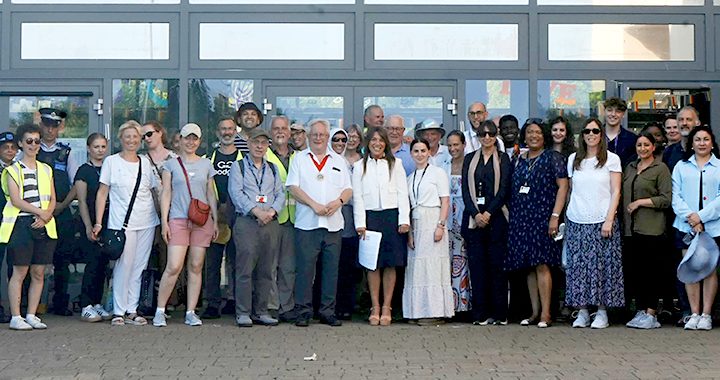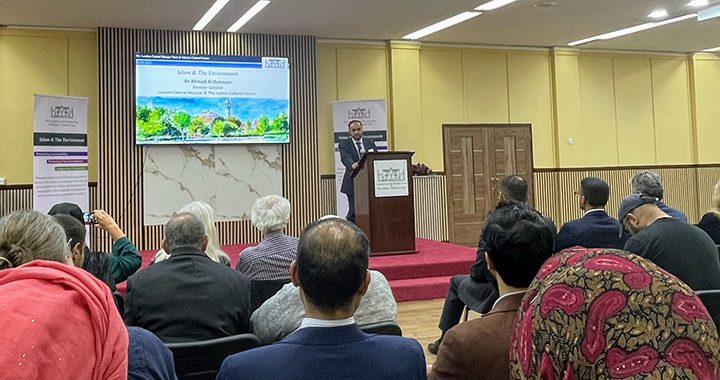– Caring for People and Planet
Prepared by Barnet Multi Faith Forum, Environment and Sustainability Sub-Group
The holy month of Ramadan presents an opportunity to embrace more sustainable practices. By committing to net-zero goals, we can create a greener, healthier world and build a sustainable future for generations to come. Together, we can create real change through small, impactful steps.
Updated from 2024
1- Reduce Plastic Use
- Bring your own bags when shopping to reduce plastic waste.
- Switch to plastic-free alternatives like soap bars and refillable containers.
- Choose minimally packaged foods.
- Use reusable cups, bottles, plates, and utensils for social gatherings.
- Encourage children to embrace sustainability with non-plastic, recyclable toys. Books from local charities or library exchange stations also make excellent eco-friendly gifts.
2- Get Active and Stay Healthy
- Walk or cycle whenever possible to reduce car use and pollution.
- Use public transport at least once a week to cut carbon emissions and improve air quality.
- Suggest the installation of cycle racks at places of worship and community centres to encourage eco-friendly transportation.
3 – Reduce Food Waste
- Set your fridge temperature between 0-5°C to keep food fresh longer.
- Get creative with leftovers—freeze or share them with those in need.
- Donate unused food to collection points for food banks or use apps like OLIO or Too Good To Go.
- Plan shopping trips with a list and check use-by dates.
- Keep your fridge organized with clear storage containers to reduce forgotten food.
- Try going meat-free or vegan occasionally to lower your environmental impact.
4 – Compost & Recycle
- Compost organic waste to reduce landfill waste—try a wormery!
- Check local services for food waste collection and recycling programs.
- If you have dry biomass or green waste, consider making biochar or donating it to biochar facilities.
- Collect fallen leaves and use a green waste bin or make leaf mould for garden enrichment.
- Recycle candle wax for reuse and clean candle jars thoroughly before recycling.
5 – Dairy Alternatives to Reduce Carbon Footprint
- Adopt a plant-based diet and grow your own food as much as possible to reduce environmental impact.
- Participate in the “Eat More Beans” campaign and explore various bean recipes as a meat alternative.
- Try vegan or plant-based cheese alternatives, or make your own using ingredients like cashew nuts.
- Try oat, coconut, or hazelnut milk in tea, coffee, and cereal.
- Choose natural sweeteners like honey, dates, or raisins instead of processed sugar.
- Swap ice cream for fresh fruit, and butter for veggie spreads or olive oil.
- Experiment with herbs, spices, and rose water for flavorful, sustainable seasoning.
6 – Conserve Water
- Use tap water or, if necessary, opt for a water filter (if tap water quality is poor) instead of purchasing plastic bottled water.
- Take shorter showers and be mindful of water usage when washing or cleaning.
- Report leaks or blockages in public spaces to local authorities.
- Implement rainwater harvesting systems for garden use.
7 – Save Energy & Protect the Environment
- Use natural light and ventilation whenever possible.
- Turn off and unplug electronics when not in use.
- Participate in local clean-up events or pick up litter during walks.
- Report faulty street lights and lamp posts for repair.
- Improve home sustainability by enhancing insulation, installing solar panels, and switching to LED light bulbs for energy savings.
8 – Welcome Wildlife
- Support local conservation efforts.
- Set up bird feeders and leave nuts for squirrels.
- Feed ducks with peas and sweetcorn instead of bread.
- Plant trees, shrubs, and create wildlife habitats using native plant species to support and enhance local ecosystems.
- Join or start a local “friends of the park” group to engage in conservation efforts.
- Add a pond or water bowl to attract birds, insects, and amphibians.
9 – Eco-Friendly Home & Gifts
- Choose sustainable materials for decorations.
- Make handmade gifts and use minimal wrapping.
- Buy from eco-conscious suppliers.
- Use wood in construction to sequester carbon within buildings while integrating green roofs or vertical gardens in urban areas to promote sustainability and enhance biodiversity.
- Give unused gifts to charity, helping to reduce waste and support those in need.
10 – Sustainability Personal Choices
- Limit air travel and opt for low-carbon alternatives.
- Invest responsibly by considering greener and more ethical options for stocks, shares, and insurance.
- Participate in the Big Bank Switch campaign, moving to banks committed to positive social and environmental impact.
- Extend your smartphone’s lifespan instead of upgrading for trends.
- Set personal reduction goals and calculate your carbon footprint using free apps.
- Use the EarthHero climate app to learn about achieving net-zero personally and embracing low-carbon living.
- Offset your carbon emissions by voluntarily purchasing verified greenhouse gas removal credits.
- When calculating emissions, consider Scope 3 emissions, which include indirect emissions from supply chains, travel, and product use.
11 – Support Local Produce
- Follow the LOAF principle when shopping:
- Locally produced: Reduce carbon miles from transportation.
- Organically grown: Minimize toxicity and protect pollinators.
- Animal friendly: Support ethical treatment of animals.
- Fairly Traded: Promote fair pay, humane working conditions, and the prevention of child labour, exploitation, and human trafficking.
- Support small businesses and local artisans.
- Grow your own food in community gardens and share knowledge with others.
12 – Engage with Your Community
- Promote a culture of sustainability by example, sharing your efforts, and inspiring others.
- Organise sustainability-focused events, including clothing and appliance swap events, upcycling workshops, and local repair cafes or tool libraries.
- Encourage and support sustainability policies at local, industrial, national, and global levels.
- Raise awareness about emission reduction, carbon removal, and sustainable practices.
- Track and share waste bin usage at community gatherings to encourage waste reduction.
- Join local walking groups to promote health and reduce carbon emissions.
- Rewild community gardens or centre yards with plants that attract pollinators.
These are just suggestions—view sustainability as an opportunity, not a sacrifice, and
implement as many tips as possible. Every action matters for a meaningful impact.
Please share and spread the tips. Thank you.



